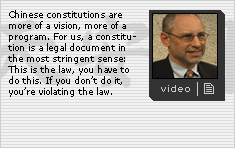|
 |
 |
 |
 |
 |
The Chinese Enthusiasm for
Constitutions |
 |
 |
|
Chinese Constitutions are a
Program |
 |
 |
|
|
 |
| Why Democracy Never Worked in China |
 |
| Time and time again, the Chinese in the twentieth century came back to try to reconstruct the democratic system, and it never really worked. By that I mean that China never had real individual freedoms that people could count on. It never had a real functioning legislature that independently passed laws and supervised the government. Twentieth-century China never had elections that really worked, were relatively free of corruption, and enabled people to decide among differing and genuinely competing political philosophies. Democracy was never consolidated. Instead, there was this terrible history, first of warlords from about 1910 through the 1920s, and then of authoritarian government under the Kuomintang, the Nationalist Party. The Chinese also had to contend with the Japanese invasion and World War II. Then there was a civil war. Then the Communist regime came into power, and the country experienced a series of turmoils—the Great Leap Forward, famine, the Cultural Revolution, Maoist dictatorship. Finally, there came the reform period under Deng Xiaoping, who opened China up for economic reform but did not open up the political system very much. So a series of disappointments marked the history of democracy movements in China in the twentieth century. |
 |
| From Backwardness to Development |
 |
 |
 |
  |
 |
|






